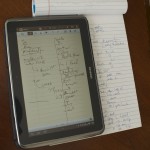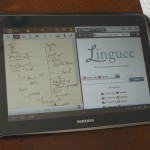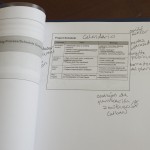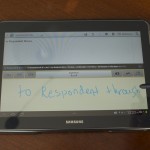I read the news about Waverly Labs’ new in-ear realtime translation device (video below) with great interest. With rapid advances in artificial intelligence (AI), interpreters are sometimes asked if technology will soon replace us. The short answer is that technology definitely assists good interpreters and translators, and may eliminate the need for expenditure of human brain effort on certain large-volume, low-priority projects. But, while I do embrace new technology to assist me in my translation and interpreting work, I’m not the least bit concerned that it will send me to the unemployment line.
Continue reading
Tag Archives: interpreting
When Court Certified Isn’t Enough
I’m always glad when a potential client calls me for the first time to check availability and rates. And I really like it when they also ask, “By the way, you are court certified, right?” This tells me the client is interested in doing things right—my kind of client. But, before I answer that question, I always have an internal debate over how detailed my answer should be. Normally, I conclude that they just want to know if I’m qualified to interpret for the assignment they are asking me about. So, I just say, “Yes.”
But, at least here in Texas, this seemingly straightforward question is actually quite complicated. I hope this post will shed some light on qualifications for court interpreters in Texas. Continue reading

The Paperless Interpreter Experiment: Part II
When I posted about my first experiment with paperless interpreting a few months back, I heard from interpreters around the world who had come to the same conclusion: the iPad is great for accessing references, but not for taking notes while interpreting.
- The old way. Don’t mind my handwriting.
- The old way: Pen and paper. The paper never runs out of battery but even my favorite pens (TUL) betray me sometimes.
But I’m happy to announce that I have since gone (nearly) paperless, thanks to the Galaxy Note Tab 10.1.
- Size comparison to my usual legal pad
First the summary, then the details. Click on any photo to see a larger version.
Summary:
While it’s still not a perfect device, the Galaxy Note fulfills my requirements and continues to delight me. I still bring half a reporter’s pad to interpreting jobs out of paranoia (and to jot down unusual spellings for the court reporter), but I’ve now successfully used the Galaxy tab rather than paper for notetaking for several months.
The Experiment
Hardware: Samsung Galaxy Note Tab 10.1″ + integrated stylus
- Samsung Galaxy Tab with Samsung’s magnetized book case
- Samsung’s magnetized book case
Apps:
- S-Note (included)
- iAnnotatePDF (free)
- Dolphin Browser (free)
Results
- Interpeting Notes. PASS
This is the first tablet I’ve found that is actually designed for handwriting. l like that the tablet will register my actual handwriting for interpreting notes, as opposed to converting handwriting to typed text.
- Finally, a tablet designed for a stylus
- My handwriting naturally borders on illegible during interpreting, but you can see that the tab doesn’t distort my writing at all.
The Note integrates its stylus in a lot of neat ways, with the Android customizability that I’ve grown to love. l can set a shortcut so that a program of my choosing opens automatically when I dislodge the stylus from its nest. Also, when the stylus is disconnected, certain programs turn off recognition of my hand or fingers entirely, rather than masking certain parts of the screen à la iPad.
My fingers do occasionally hit the OS taskbar and open menus unintentionally, but I fully expect to find an app that allows me to customize the taskbar as I did with my Android phone (which I’ve set to hide the taskbar that shows battery, network, etc. until I pull down from the top of the screen with two fingers).
- Reference: PASS
Glossaries and apps are equally accessible as with iPad but this tablet has a couple of additional capabilities that knocked my socks off:
Split screen. The Note allows true multi-tasking, with split screen or moveable floating windows.
- Split screen: S-Note on the left, Dolphin Browser on the right
- Printed notes from iAnnotate
iAnnotate. This app allows me to overlay handwritten notes on a PDF. I can export the whole thing to a PDF and store it in Evernote, email it, or print it.
- Work during downtime: FAIL
It was only fair to fail the Note in this area because it won’t replace my laptop entirely. However, I definitely use the Note for word processing much more than the iPad.
Composing documents using handwriting recognition has enabled me to get more done during those little lulls between interpreting jobs that are too short to go back to the office. The handwriting recognition engine is the best I’ve seen, by far. Rather than recognizing strokes or letters, the engine recognizes the whole word as I write, even if I go back and add a letter in the middle of the word. The latest update also fixes an annoying need to manually add a space after each word.
- Handwriting recognition – words
- Handwriting recognition
- Handwriting recognition – phrases
Note: The photos show an inaccurate conversion because I took the photos while the handwriting was still visible to show the engine at work. Once I stop writing, the recognition engine finalizes its choice, which is usually correct, but by that time the handwriting is no longer visible.
The downsides to real work on the Note is that it requires a Microsoft-compatible app rather than allowing me to actually use Microsoft Office. This means that formatting sometimes gets messed up after I open a document in the tablet. Interacting with Word and Excel documents is definitely easier with the Note’s stylus compared to the iPad, though.
If this were my top priority l would buy the Surface, which offers the real Microsoft Office and very sleek external keyboards.
- Entertainment: PASS
As l mentioned last time, my criteria are low for this, but l can use Twitter and read the Economist.
So there you have it, a perfect excuse to justify a new gadget as a business expense and save some trees at the same time. What do you say?
Language Reads: Dreaming in Hindi
Language Reads is a series designed to give a brief book review from a language professional’s perspective. Fellow translators, interpreters, and language lovers are welcome to submit guest reviews.
- Title: Dreaming in Hindi: Coming Awake in Another Language
- Author: Katherine Rich
- Pages: 384
- ISBN: 9780547336930
Dreaming in Hindi traces the author’s personal journey as she learned Hindi while living in India. This book delighted me because it brought back so many memories of my own experiences as I acquired Spanish as a foreigner in Mexico, including the tumultuous dismantling of my own first-language identity. Learning a language in a foreign country is a task that is all-consuming, exhausting, and fraught with cultural pitfalls. Rich lets us live through this experience with her. She also presents a healthy dose of fascinating linguistics research, in brief summaries and anecdotes that should be quite accessible even to those without a linguistics background.
Overall, I really enjoyed this book and recommend it for anyone who is interested in language acquisition or intercultural interactions.
Update – 2013 Federal Court Interpreter Exam
Yesterday, registration opened for Phase II of the Federal Court Interpreter Certification Exam. Since I was fortunate enough to pass Phase I (Written) last year, I registered right away to (hopefully) test for Phase II in my home city. This way, I can avoid combining travel stress with the stress of a test that won’t be available for another two years if I fail it. Which won’t happen, of course. (Positive thinking…)
FCICE has announced that the exams will be administered the week of July 15th, but it seems we won’t have a firm date until after the registration period closes on May 17th.
After the exam, FCICE warns us that Spanish applicants may have to wait up to 13 weeks for results. Applicants for other languages may have to wait even longer. Which means that I will probably check my mailbox at least 78 times from July to October, or 65 if Saturday delivery is canceled.
Did you also pass Phase I last year? Go straight to the Phase II registration page here. Thinking of starting the FCICE process when the written exam is administered next year? There are some materials available, including a practice oral exam.
Saying Adiós to 2012 and Setting No Goals for 2013
This little business has me doing fantastically interesting and varied work all over Dallas/Fort Worth and sometimes beyond. And it just keeps getting better. This year was off the charts and I am thankful.
Inspired by this article in the Harvard Business Review, rather than specific goals I’m going to look at what I want to spend time on in 2013:
- Continuing education. From a course on advanced legal editing to a workshop on improving my speaking voice, regular continuing education has been worthwhile both to improve my skills and, best of all, to get to know more people. Interpreting is solitary work most of the time so these relaxed learning days are refreshing and a great way to keep improving my game.
- Pro bono services. This year I got to provide almost four weeks of conference interpreting and bilingual multimedia services for nonprofit groups.
- Mentoring. I believe that we are all able to reach back and help someone who is not quite as far down the road as we are. This year I got to help two local interpreters improve their skills and earn higher rates, share advice with a translation student at my alma mater, and continue providing real-world practice for my intern.
- Criminal cases. Although I’ve interpreted hundreds of hours in administrative courts and almost as many in civil cases, so far I’ve been timid about criminal matters. But the criminal cases I have taken have gone great, with very good feedback from defendants, attorneys, and judges, so for 2013 I’ll stop giving preference to civil cases.
- Translation. Interpreting is exhilarating but even after extensive preparation you always drive home from an interpreting job thinking about things you could have expressed better. Translating documents, on the other hand, affords me the chance to be a writer, mulling over the best way to phrase a sentence, researching a little more, sleeping on it and tweaking the text till I’m totally satisfied.
- Non-work. As I ease back from my habitual emphasis on productivity and advancing toward goals, I want to spend more time on spiritual edification and personal interests like photography, guitar, Crossfit, and homemade ice cream.
Does your outlook for 2013 look similar? Is there anything you definitely want to spend more time on this year?
Hat tip to Catherine Christaki, Greek translator, for sharing the Harvard Business Review article on LinkedIn.
Announcement – 2013 Federal Court Interpreter Exam
A few months back, I received the great news that I had passed the Phase One (Written) portion of the Federal Court Interpreter Certification Exam. Since then, I have been compulsively checking the FCICE web page to see when registration will open for the Phase Two (Oral) Exam. Since the Phase Two exam is only offered in odd-numbered years (2013, 2015, 3001, etc.), I have been eager to set up my study timeline and meet this beast head on in 2013.
So I am thrilled to announce that the wait is over, as the FCICE has announced the registration period:
- Registration Opens: Monday, March 25, 2013 8:30 A.M. ET
- Registration Closes: Friday, May 17, 2013 at 5:00 P.M. ET
No word yet on actual exam dates, but I registered for the Phase One exam in May 2012 (got the last slot in the location most convenient to me, whew!) and all exams were administered within a short period in August 2012. It looks like this year’s timeline may be similar. More details at the FCICE site.
What Does “Preciso” Mean?
I’m always interested to look at this site’s analytics to see how people arrive. In addition to people searching for how to say Holly in Spanish, there are also many visitors looking for the meaning or language of the word preciso.
Never one to miss an opportunity to please, here you have it:
- Preciso is a Spanish word that comes from the Latin word praecīsus according to the Real Academia Española.
- Preciso‘s most common meaning can be translated into English as precise, accurate, specific, or exact, though in some contexts it can have a different meaning.
I chose it as the name for my translation company because it embodies my goal of getting it exactly right whenever I translate or interpret for my clients.
P.S. While we’re at it, the name Holly comes from the common name for a plant family called Ilex. It has green leaves and small red berries. From what I gather, in Spanish the common name for this type of plant is acebo, so technically that would be the Spanish equivalent of the name Holly. Not nearly as nice as Rose/Rosa or Margarite/Margarita, am I right?














